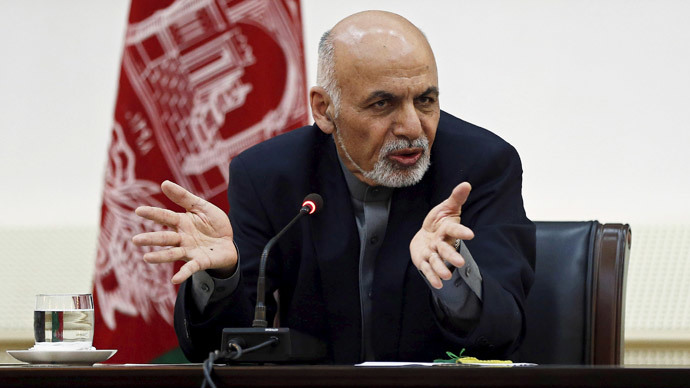Afghanistan: No end for Obama’s endgame

Afghan President Ashraf Ghani's visit to the US has sparked a new debate on the future of Afghanistan which for centuries played a special role, remaining unconquered by superpowers repulsing offensives with old British rifles and Kalashnikov’s.
With America the last superpower to launch its own “Afghan project” more than 13 years ago under President George W. Bush, all eyes are focused on his successor, President Obama. The core question is whether Americans should entirely leave the country after last year's pullout of the main contingent of NATO’s International Security Assistance Force or stay, and if so, in what numbers and with what mission yet to be accomplished.
Weeks before President Ghani's visit which began Sunday, the Obama administration unveiled its new big Afghan surprise. First, it was Defense Secretary Ashton Carter who hinted that Washington might slow the pace of withdrawal for the remaining 10,600 American troops.The statement made by the Pentagon chief during a visit to Kabul was shortly followed by a leak from an administration official that President Obama is planning to abandon his initial plans to cut the number of US forces in Afghanistan to 5,500 by the end of this year and wants to keep more troops in the country, including into the 2016 fighting season. It is expected that the details of the new security deal will be sealed during Ghani’s visit, which will be watched with keen interest all over the world.
READ MORE: Afghan leadership duo visit US to secure troops, aid
While President Bush launched the military intervention in Afghanistan to disrupt the al-Qaeda network and destroy the Taliban regime, Obama has built his presidency on the promise of scaling down and then suspending military operations in Afghanistan and Iraq. So, is Obama backtracking on his initial decision to withdraw from Afghanistan, and if so, why? Finally, is the time even right for the Americans to pull out?
In a thought-provoking article, “Leave Afghanistan To The Afghans: Obama Administration Should Speed Military Withdrawal”, in the Forbes magazine independent expert and contributor Doug Bandow argues that the very idea of slowing down the withdrawal contradicts basic American interests and will only result in more meaningless human and material losses.
“America has been at war in Afghanistan for more than 13 years, as long as the Civil War, Spanish-American War, World Wars I and II, and Korean War combined. U.S. troop levels peaked at 140,000 in 2010. More than 2200 Americans died in a conflict reflecting little more than purposeless inertia,” writes Doug Bandow, adding that in recent years, Washington and its allies were building a large government bureaucracy and security force in Kabul “on a potential foundation of sand.”
So why can't the Americans withdraw once and for all, leaving the fate of Afghanistan in the hands of its people? Well, the idea to leave Afghanistan to the Afghans sounds naïve, to say the least. The American operation in Afghanistan has led to quite a paradoxical result: while the initial idea was to build a democratic and prosperous Afghanistan which would presumably enjoy full political sovereignty, today as never before the fate of Afghanistan lies more in the hands of external forces – regional powers and superpowers - than in the hands of the Afghans themselves. Whether one likes it or not, it will remain a state with very limited sovereignty and potential for independent actions.
Let us have a closer look at this point. The first external force which would increasingly shape up the security environment and political situation in Afghanistan after the presumed US withdrawal would be neighboring Pakistan. It is an open secret that large swatches of Pakistan’s territory are not controlled by the government in Islamabad, but rather by various groups of Islamic militants.Pakistan is joined to Afghanistan by the Pashtun tribal belt where the law of Pakistan has no sway.
READ MORE: US to delay Afghanistan withdrawal, leave more troops – report
It is obvious that if the Americans complete their withdrawal, it will embolden Islamic militants in both Afghanistan and Pakistan, giving new steam to radical Islamic movements not only in these two countries, but also in the rest of Central Asia and even China, with the potential to create a major threat for the nearby former Soviet republics.
The other crucial factor which will hardly allow the Americans to risk leaving Afghanistan to the Afghans is the rise of the Islamic State in Syria and Iraq with its idea of global Islamic revolution. With the emergence of ISIS, the Middle East has turned into a testing ground for a destabilization model that will be exported to other regions. The Syrian or Iraqi “model of destabilization” can be effectively applied in Afghanistan, with external forces playing a key role.
This is not exactly a remote scenario, as independent sources point out that ISIS ranks in Syria already contain jihadists from Afghanistan. What we can thus see will be a connecting of the Syrian, Iraqi, Yemeni, and Afghan dots into a single arch of instability ranging from the Middle East to Central and South Asia.
And this is not the whole list of all the grave security risks related to Afghanistan. If the Taliban is allowed to overthrow the President Ghani regime, it can then attempt to destabilize the government in Islamabad, which is still a key American security partner in the region despite all the odds. So, the “Somalia-ization” of the region, which now looks like a product of someone’s wild imagination, can soon become a reality.
All in all, it looks like there is no speedy end for President Obama’s endgame in Afghanistan. Launching his global campaign on this sun-soaked muddy terrain, President Bush thought he was acting as a responsible global leader. Subsequently, global responsibility requires President Obama to stay there for more time. The price of the operation in Afghanistan for the US has already exceeded $673 billion, but if they allow Afghanistan to turn into another springboard for global jihad, then there will obviously be an even larger cost that can't be measured in dollars and cents.
The statements, views and opinions expressed in this column are solely those of the author and do not necessarily represent those of RT.
The statements, views and opinions expressed in this column are solely those of the author and do not necessarily represent those of RT.













